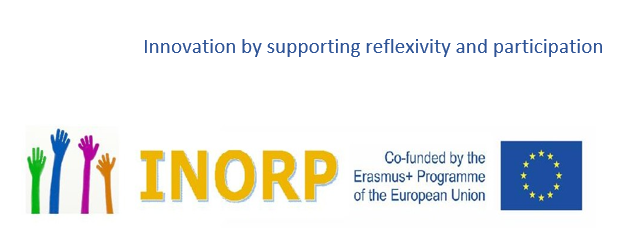Reflexivity and participation in communities

6. Post-graduate module suggestions (2nd cycle)
6.2. Example 2: Participation in the context of disability services
(to be elaborated in seminar discussions, covering all sections through exercises over a period of 10 hours)
| Theme | Topic and skills | Guiding questions |
|
Basic and specific |
Consideration to the international and national legal framework of the rights of people with Practical consequences for social work of regarding Importance of the social model of disability: “the subjective meanings individuals with Intellectual and Developmental Disabilities (IDD) attribute to their own lives, their dreams and their aspirations continue, in many cases, are being ignored” (Neuman, 2020) Critical questions regarding participation and disability: Participation needs to be conceptualised and applied as fluid and multifaceted: |
What direct experiences of encounters with people with disability do I have? To what extent can I consider my own abilities to be limited? What are the main factors why people with disability are not In which areas did people with disability gain |
|
Priorities set by people with disability |
Study of research findings 1. Self-determination: “participation was not only framed as ‘success’, ‘independence’ or ‘fulfilment’, as contemporary discourses may 2. Inclusive environments: “Research draws attention to the importance of shifting responsibility for inclusive practices to society, rather than onto the individual. Yet, despite this need for a societal solution, some research participants held an individual responsibility for their integration”. (ibid., 56) 3. Identity integration / intersectionality: “Participants alluded to at least three identity postures grounded in the connexion of ageing and disability: that of older citizens who are equal to others, that of long-term activists struggling for social justice and that of persons who are living the tensions between ageing and ageing with a disability” (ibid. 57). |
Which of these priorities set by people with disability coincide with core social work principles, which go beyond them? How do you understand intersectionality and the importance of identity policies in relation to disability? |
| Collaborative intervention strategies |
The social model of disability: focused on the critique of oppressive practices The rights approach stresses the role of legal instruments in protecting the well-being of people with disabilities The developmental approach is associated with the integration of people with disabilities into the social and economic life of the community and goes beyond offering “individualised solutions” The participative turn: The rights-based, developmental approach 1. emphasizes the leadership of people with disabilities and their organizations in campaigning for rights, services, and opportunities. It also recognizes their right to self determination and to be protected against discrimination., 2. a rights-based, developmental approach places emphasis on community living and seeks to normalize living arrangements of people with disabilities. 3. To promote economic and social integration, it requires social investments that ensure the acquisition of educational qualifications and skills that facilitate the full participation of people with disabilities in the productive economy. (Knapp & Midgley, 2010, 94) The ”Dare to Dream” Project (Neuman, & Bryen, 2022). See below |
How do you understand the interaction of the “material” and the “constructed” aspects of disability in your approach to Beyond which threshold does the application of a “rights approach” problematic in relation to work with people with disabilities) |
Resources:
Raymond, É., Grenier, A., & Hanley, J. (2014). Community participation of older adults with disabilities. Journal of Community and Applied Social Psychology, 24(1), 50–62. https://doi.org/10.1002/casp.2173
Beresford, P. (1999) 'Making participation possible: Movements of disabled people and psychiatric survivors', in Jordan, T. and Lent, A., (Eds.). Storming The Millennium, London: Lawrence and Wishart (pp. 35-50).
Beresford, P. (2000). Service users’ knowledges and social work theory: Conflict or collaboration? British Journal of Social Work, 30(4), 489–503. https://doi.org/10.1093/bjsw/30.4.489
Croft, S. and Beresford, P. (1996). 'The politics of participation', in Taylor, D. (ed.), Critical Social Policy: A Reader, London: Sage, pp. 175-198
Ellcessor, E. (2016). Restricted Access: Media, Disability, and the Politics of Participation. New York, USA: New York University Press.
Knapp, Jennifer, & James Midgley, (2010); 'Developmental Social Work and People with Disabilities',
in James Midgley, and Amy Conley (eds), Social Work and Social Development: Theories and Skills for Developmental Social Work (New York, online edn, Oxford Academic, 1 May 2010), https://doi.org/10.1093/acprof:oso/9780199732326.003.0005
Neuman, R., & Bryen, D. N. (2022). Dare to Dream: The Changing Role of Social Work in Supporting Adults with Intellectual and Developmental Disabilities. British Journal of Social Work, 52(5), 2613– 2632. https://doi.org/10.1093/bjsw/bcab195
Neuman, R. (2020). ‘The life journeys of adults with intellectual and developmental Disabilities: Implications for a new model of holistic supports’, Journal of Social Service Research, 1–16. 10.1080/01488376.2020.1802396.
The ”Dare to Dream” Project (Neuman, & Bryen, 2022, 2622).

The ”Dare to Dream” Project (Neuman, & Bryen, 2022, 2626).

The ”Access Kit” (Ellcessor, 2016, p. 19).

